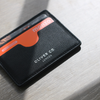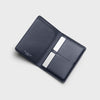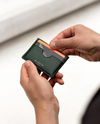OUR MATERIALS
Apple Leather
A Unique Story for a Unique Fabric
The story of Apple leather started in 2004. Alberto Volcan, an inventor from Italy, was looking for ways to use leftover apple waste from the fruit juice and compote industry in Northern Italy.
His first creation was an ecological paper, made using 15% apple waste, that reduced the CO2 impact by 20%-25% compared to other papers. This was just the beginning though, and he saw potential for further commercial products. He decided to join forces with Frumat, a company specialising in the recycling of industrial waste, to take his ideas further.
One of the first projects developed was a vegetable glue, which in itself wasn’t successful. Alberto didn’t give up though, and instead reworked the glue to be placed through a pasta machine. The sheet of fabric created became the basis of apple leather! Developed further and made commercially viable with the help of Frumat, this ecological, breathable, waterproof and durable fabric has been a game changer in the industry.
When apples are pressed for their juice, there are solids left over. This apple pomace, as it’s called, is much too good to be thrown away as organic waste. Due to its high cellulose content, apple pomace is ideal for up-cycling into new fabrics.
How is Apple leather made?
Apple leather, also known as AppleSkin, is a bio-based material made using the leftover pomace and peel from the fruit juice and compote industry.
Originating from the region of Bolzano in northern Italy, the fabric is created by first taking the recovered apple waste and reducing it to a powder. Once processed, it is sent to a factory located in Florence, where it is combined with polyurethane and coated onto a cotton and polyester canvas.
The apple leather used in our products is made using 50% apple waste mixed with 50% PU, coated onto a cotton/polyester canvas. The result is a durable but soft fabric that is perfect for hardwearing small accessories.
What are the environmental benefits?
One of the most important aspects of using the apple waste is that it is a completely renewable resource. This reduces the CO2 impact significantly compared to faux leather made from 100% fossil fuels.
What makes apple leather even more special is that the renewable resource is also from a natural waste stream. The special apple pomace produced in the industry is classified as a special waste and in most cases ends up in landfill or in some cases burned for fuel.
Apple Leather LCA
Recently Frumat completed a life cycle assessment that compared a synthetic leather made with, and without, apple waste. The diagram below shows the relative comparison, with the apple leather’s performance in green. The most notable reductions come in the Stratospheric ozone depletion, Land use and Marine eutrophication.
The full LCA can be found here
Is plastic in vegan leathers bad?
As it currently stands, the addition of a plastic plays a pivotal role in the durability of bio-based leathers. Without it, the materials wouldn’t endure the general wear of every day life, and extending the life cycle of a product is an incredibly important aspect of sustainability.
Whether it's grape leather, corn leather, pineapple leather or even mushroom leather, a small amount of plastic is required. Plant-based polyurethanes are progressing however these still contain 30% petroleum-based PU in order to ensure longevity and stability.
As technology progresses, the reliability on plastics will reduce significantly. For now though, it is a key ingredient and will ensure your Oliver Co. products last.
What about real leather?
Aside from the ethical issues concerned with leather, according to the Sustainable Apparel Coalition’s Higg Materials Sustainability Index – which measures impact up to the point of fabrication – leathers have an impact of 176, compared to Polyurethane based fabrics that have a score of 29.9. This is due to its high contribution to global warming, water use and pollution.
Also you shouldn’t forget that leather also requires a considerable amount of chemicals to ensure that it doesn’t biodegrade during use. There are certainly more sustainable leathers being produced, however you must ensure you research a company's processes and ethics fully before purchasing.
Further FAQs
How durable is Apple Leather?
The durability of a material is often put down to two properties: tensile strength and abrasion resistance.
Tensile strength is a measure of a material's resistance to breaking under tension. This is an important factor for wallets and accessories that, when filled with cards, will have tension applied.
In accordance with ISO 1421:2000 tensile testing, the apple leather used in our main collection has a tensile strength of 500 - 700N/5cm
That is, that 500-700 N of force is applied to a 5cm testing sample before it failed. To give context to this, the minimum requirement for car interiors is 200N/5cm. This is why Volkswagen recently announced that they were to use the same apple leather that we use in the upholstery of their new electric cars.
Abrasion resistance is the ability of a surface to resist being worn away by rubbing or friction. This is a very important property for accessories that are often taken in and out of pockets or placed in a bag where they rub up against other objects.
The Martindale test is used to measure apple leather's resistance to abrasion. It gives an indication of how well the material will withstand natural wear by rubbing it against a standard abrasive surface with a specified force.
In the test, apple leather scored a rating of 50,000. To give this some context, the national German textile institute specifies a minimum requirement for various applications of interiors:
- Private use: 10,000 - 15,000
- Office use: 25,000-35,000
- Public transport: 30,000 - 40,000
As you can tell, our apple leather will therefore require a lot of use before it shows any signs of ageing on its surface. A key quality if you want your wallet looking as good as the day you bought it.
Where is Apple Leather made?
The Apple pulp used to make Apple Leather originates in Bolzano in northern Italy, one of the largest apple producing regions in the world. Once processed, it is sent to a factory located in Florence, where it is combined with polyurethane and coated onto a cotton and polyester canvas.It's manufactured in Florence, Italy
Is Apple Leather waterproof?
Apple Leather is an excellent water resistant fabric that when wet can easily be wiped down without any damage to the material. It is not recommended however to submerge the fabric in water.
Is Apple Leather biodegradable?
No, Apple leather is currently not biodegradeable. This is because there are two key non-biodegradeable ingredients that are important for the materials durability: Polyester in the backing, and Polyurethane (PU) in the upper.
Could it be biodegradeable in the future?
Polyurethane is actually degradable, however it doesn't respect 180 days, so it can’t declared as biodegradable. Biodegradable PU’s exist however aren't currently durable enough. Hopefully as the technology improves, we can expect to have a biodegradable PU that is fit for purpose.
With regards to Polyester, this currently can't be removed as the cotton backing on its own isn't strong enough. Recently there has been development of Polyester yarns that are impregnated enzymes that activate to degrade the polyester once placed in bio-degradeable conditions. There has also been a development of chemically engineered natural fibres that act like petroleum based yarns. Both options are exciting and could be used as a backing material in the future.
It is important to note though, that even if the apple leather were to become fully biodegradeable, when assembled into a small accessory, the other components would also need to be biodegradeable. Often it can be difficult to disassemble accessories, so all stitching, glues, linings etc. would need to be considered otherwise the same issue of the product going to landfill exists.
What certifcations does Apple Leather have?
Apple leather has the following certifications:
- PETA approved Vegan
- USDA Bio-preferred approved
- OEKO-TEX certified
What products use Apple Leather in the Oliver Co. range?
We use Apple Leather in our Vegan wallets, Vegan Card holders, Laptop Cases, Passport Holders & Keyrings
Our Best Selling Apple Leather products
Our collection of men's and women's Vegan Wallets, Cardholders and Laptop Sleeves, use Apple Leather to create highly functional, premium accessories that stand the test of time. Each one ethically handcrafted by our factory in Istanbul, and using the very best recycled and organic linings.







